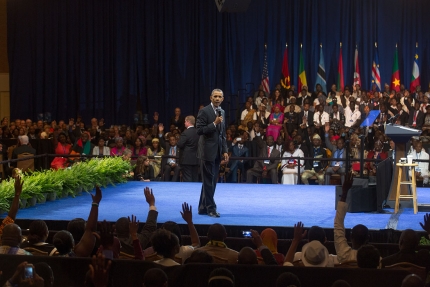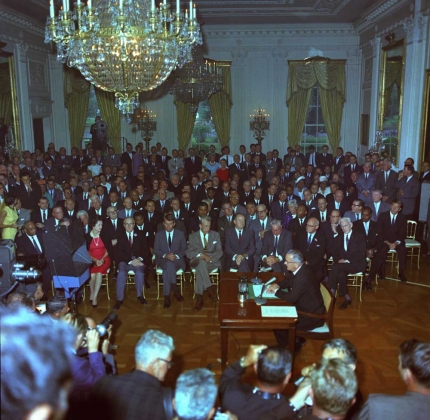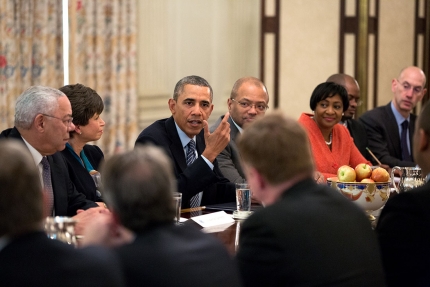Blog Posts Related to the African American Community
Empowering Africa's Next Generation of Leaders
Posted by on July 28, 2014 at 3:44 PM ESTPresident Obama’s town hall today with 500 of Africa’s most promising young leaders provided an inspiring window into what the future holds for Africa, and the world.
The 500 participants in the Washington Fellowship program were selected from nearly 50,000 applicants from across Africa, as part of the President’s Young African Leaders Initiative (YALI). YALI was launched by President Obama in 2010, as part of a long-term investment in the next generation of African leaders. It aims to sharpen their skills, to improve their networks, and to strengthen partnerships between the United States and Africa for years to come.
The President announced during the town hall that the Washington Fellowship was being renamed as the Mandela Washington Fellowship for Young African Leaders, in honor of the former South African President, Nelson Mandela. Mandela Washington Fellows represent the best and brightest from communities across Africa, and fields ranging from education, medicine, law, business, and beyond. These are the young leaders whose skills, passion, and visions for the future, will help shape the fate of their countries and the world. It is in everyone’s best interest to help them prepare with the tools they need to build a healthier, more secure, more prosperous, and more peaceful Africa, which is why President Obama launched YALI in the first place.
Learn more aboutHonoring Dr. Maya Angelou
Posted by on June 7, 2014 at 6:58 AM ESTDr. Maya Angelou, whose timeless works such as I Know Why the Caged Bird Sings encouraged and stirred the souls of millions of readers, passed away last week at the age of 86.
Dr. Angelou's family arranged a private memorial service in Wake Forest University’s Wait Chapel on Saturday, June 7, at 10 a.m. Eastern Time.
The First Lady, who has called Dr. Angelou one of her "she-roes" as well as a friend, spoke at the service.
You can watch Wake Forest University's video of the service below or read the First Lady's remarks here.
Learn more about , Working FamiliesBuilding on What Works With My Brother’s Keeper
Posted by on April 17, 2014 at 1:59 PM ESTWhen President Obama launched the My Brother’s Keeper initiative in February, the response from communities across the country was immediate and overwhelmingly positive. We quickly began hearing stories of creativity, collaboration, and triumphs from community leaders and organizations doing grassroots work to enhance opportunities for boys and young men of color. Some organizations, having done this work for a while, shared what types of programs and coordinated efforts they have seen work through the years, while others have responded to the President’s call to action with new initiatives and commitments of their own.
We heard from a financial services firm in Long Beach, California which has partnered with an 8th grade mentoring program to arrange field trips to their office. Students fill out applications, interview with managers, and go through mock hiring processes. They are then connected with mentors, and offered serious rewards (like laptops) when they reach GPA goals set by the company.
Learn more about Urban PolicyHonoring President Lyndon Baines Johnson on the 50th Anniversary of the Civil Rights Act
Posted by on April 10, 2014 at 5:24 PM ESTToday, 50 years after President Lyndon Baines Johnson signed the Civil Rights Act into law, President Obama spoke at the LBJ Presidential Library to honor the work and legacy of our nation’s 36th president.
“As we commemorate the 50th anniversary of the Civil Rights Act, we honor the men and women who made it possible,” President Obama said. “We recall the countless unheralded Americans, black and white, students and scholars, preachers and housekeepers -- whose names are etched not on monuments, but in the hearts of their loved ones, and in the fabric of the country they helped to change.”
Learn more about Civil RightsMarking the 50th Anniversary of the Civil Rights Act at the LBJ Presidential Library
Posted by on April 10, 2014 at 9:45 AM ESTEd. note: Tune in to whitehouse.gov/live at 11:50 am ET to watch President Obama's remarks at the LBJ Presidential Library to commemorate the 50th anniversary of the signing of the Civil Rights Act.
In early December 1972, heroes of the Civil Rights Movement of the 1950s and 1960s, braved a rare Austin ice storm to convene at the LBJ Presidential Library for a Civil Rights Symposium. Towering figures like Hubert Humphrey, Barbara Jordan, Clarence Mitchell and Earl Warren rose to the stage in the course of the two-day conference to reflect on the movement they had helped to foster while examining the issues where progress was still needed.
Among them was the host of the gathering, Lyndon Baines Johnson, the thirty-sixth President. It was he who, during the course of his five-year presidency, had sounded a death knell to racial inequality through a triumvirate of laws: The Civil Rights Act of 1964, the Voting Rights Act of 1965, and the Fair Housing Act of 1968.
He considered the second—the Voting Rights Act—his greatest legislative achievement. As with all of them, it had come hard. In March 1965, after a protest march in Selma, Alabama, was brutally thwarted by state troopers, he stood before a joint session of Congress knowing that his plea for the law would fall on the deaf ears of segregationists in his own party. His voice strong, his will determined, he said:
It was more than a hundred years ago that Abraham Lincoln, a great president from another party, signed the Emancipation Proclamation, but emancipation is a proclamation and not a fact. A century has passed since the day of promise. And the promise is unkept.
What happened in Selma is part of a larger movement, which reached into every section and state of America. It is the effort of American Negroes to secure for themselves the full blessings of American life. Their cause must be our cause, too. Because it is not just Negroes, but really, it’s all of us who must overcome the crippling legacy of bigotry and injustice.
And we shall overcome.
Learn more about Civil RightsAn Update on the President’s My Brother’s Keeper Initiative
Posted by on April 9, 2014 at 9:50 AM EST“My administration’s policies—from early childhood education to job training, to minimum wages—are designed to give a hand up to everybody, every child, every American willing to work hard and take responsibility for their own success. That's the larger agenda.
But the plain fact is there are some Americans who, in the aggregate, are consistently doing worse in our society—groups that have had the odds stacked against them in unique ways that require unique solutions; groups who’ve seen fewer opportunities that have spanned generations. And by almost every measure, the group that is facing some of the most severe challenges in the 21st century in this country are boys and young men of color.”
President Obama used these words to launch My Brother’s Keeper, his initiative to help ensure that boys and young men of color in America have the opportunity to reach their full potential.
Since then, the public response has been overwhelming. We’ve heard from private philanthropies and businesses, mayors, state and local leaders, faith organizations, community based non-profits, and thousands of interested citizens, all who are committed to creating more pathways to success for these boys and young men. We will continue to engage and listen to these critical voices and those of the boys and young men this initiative focuses on, as we continue to learn from the efforts of the many stakeholders who have been committed to this cause for years. And we will do our best to live up to the optimism and incredible expectations this initiative has unleashed.
Learn more about Urban Policy
- &lsaquo previous
- …
- 3
- 4
- 5
- 6
- 7
- 8
- 9
- 10
- 11
- …
- next &rsaquo


